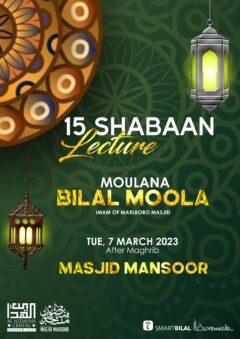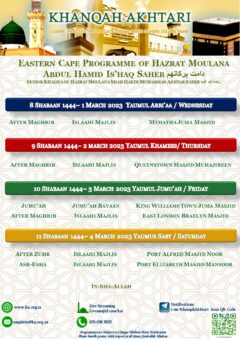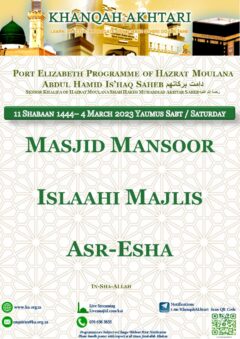People are searching for the meaning of life and the reality of existence. These questions have occupied great minds through the centuries. Today is no different. The interest shown in books on motivation, self-help and life wisdom is a continuation of this human curiosity. Allah Ta’ala selected Prophets from humanity to convey the ultimate truths of our existence. Those who were closest to them inherited this legacy of wisdom.
After the Prophets alaihimus salaam, the greatest of human beings were the Sahaba radhiallahu anhum. Muslim scholars are unanimous that from among them the first four Caliphs were the greatest in the order of their rule. This article looks at the fourth of them, Hazrat Ali radhiallahu anhu and takes a peek into some of his wisdom regarding life’s challenges.
Early Life
Although fourth in status, Hazrat Ali radhiallahu anhu possessed many attributes and merits in which he was unparalleled. He is a unique pearl from the family of Prophet Muhammad sallallahu alaihi wa sallam, raised under his blessed hand and guidance. The Prophet sallallahu alaihi wa sallam lost his father before he was born. By the age of six his mother had passed away and by eight his grandfather. His uncle Abu Tallib takes him in and raises him as a son. Abu Talib’s wife, Fathima bint Asad radhiallahu anha raises him like a mother. When she passed away, the Prophet sallallahu alaihi wa sallam praised her saying, “My dear mother. After my mother you have loved me as a caring mother loves her child. Many times you went hungry in order to feed me.” He made Dua for her, wrapped her in his Qamees (long shirt) and dug the niche in her grave himself. (Tabrani)
The Prophet sallallahu alaihi wa sallam grows up, marries and moves on with his life. Fortunes change and Abu Talib now undergoes difficult financial circumstances. His family rally to his assistance by adopting his children and the Prophet sallallahu alaihi wa sallam takes in Hazrat Ali radhiallahu anhu. He was around five years old at the time according to some views. As a result, he grew up never having worshipped idols. It was a test of the truth of the call of Prophethood that those closest to the Prophet sallallahu alaihi wa sallam were the first to accept. Hazrat Ali radhiallahu anhu becomes the first child to accept Islam.
He benefits from the Prophetic upbringing and becomes a renowned orator, and a fearless warrior, with unparalleled intellect, wisdom and foresight. He was known for his proficiency as a judge and for his expertise in Fiqh (legal rulings). His eloquence in poetry was just one of his many skills. He stood by the Prophet sallallahu alaihi wa sallam in the 13 years of hardship in Makkah Mukarramah. He was the one who slept in the Prophet sallallahu alaihi wa sallam’s bed when he emigrated to Madinah Munawwarah and assassins were surrounding the house. He marries the beloved daughter of the Prophet sallallahu alaihi wa sallam, Hazrat Fathima radhiallahu anha in the second year after the migration to Madinah Munawwarah. From their union, through their sons Hazrat Hasan and Hussain radhiallahu anhuma, the noble lineage of Nabi sallallahu alaihi wa sallam continued up to today.
Among the accomplishments of Hazrat Ali radhiallahu anhu was that he was a flagbearer at the Battle of Badr while in his early 20’s. At Khaibar the Prophet sallallahu alaihi wa sallam said that he would give the flag to someone who loves Allah Ta’ala and the Prophet sallallahu alaihi wa sallam, and they love him. The flag was given to Hazrat Ali radhiallahu anhu and under his leadership the Muslims gained victory. He was sent to Yemen twice by the Prophet sallallahu alaihi wa sallam, once as a judge. He became the Caliph at a turbulent time in early Muslim history with rebels threatening the stability of the fledgling state and intent on causing chaos.
His Legacy
When it comes to Hazrat Ali radhiallahu anhu, there are two groups which are misled. One group elevated him to the divinely appointed post of Imam as the Shia do. Many others went to extremes in their love for him as well. Another group denied his status such as the Kharijites, and they even succeeded in assassinating him. We have deep love for Hazrat Ali radhiallahu anhu and acknowledge his status as one of the greatest men after Hazrat Abu Bakr, Umar and Uthmaan radhiallahu anhum.
In a like manner, people attribute many fabricated speeches and words of wisdom to him. No doubt he left behind a wealth of wisdom, but we need to be careful in what we attribute to him. An example is the well-known book Nahjul Balagha. Most of the narrations contained in it are not authentically established from Hazrat Ali radhiallahu anhu, and there are many statements which he did not make. The book was put together by a Shia author with the obvious intent of promoting Shia claims. Imam Yusuf al Nabahani rahimahullah, the great Sufi and scholar, strongly warned against reading this work.
Poetry
Poetry is an ancient manner of expression. It exists in every language. When deep human sentiments cannot be expressed in prose, they emerge in the form of poetry. The culture of every refined nation largely comprises of the unique language of poetry, and its presence plays a vital role in fashioning the mindsets of those nations. Poetry has a significant position in the history of Islam as well. Hazrat Umar radhiallahu anhu said regarding pre Islamic Arabic poetry, “Poetry is the record of the Arabs,” preserving their cultural heritage. Hazrat Hassaan ibn Thabit radhiallahu anhu unleashed his verses on the disbelievers in the time of the Prophet sallallahu alaihi wa sallam. Hazrat Abdullah ibn Rawaha and Ka’b ibn Malik radhiallahu anhuma were also accomplished poets of the Sahaba radhiallahu anhum.
Of course, poetry, like all art forms could become something that went beyond the realm of intellect and religion, and go out of the bounds of Islam. As such, the Prophet sallallahu alaihi wa sallam was not taught poetry by Allah Ta’ala but at times words would be spoken by him according to the poetic rhyme and meter. He would at times quote the poets and remarked that the truest words were said by the poet Labeed that, “Everything other than Allah Ta’ala has no value.” Labeed was one of the poets whose poem comprised one of the seven that the Arabs hung in the Ka’bah and formed the basis of Arab poetry and culture. He went on to accept Islam.
Hazrat Ali radhiallahu anhu left such a vast and varied legacy in terms of piety, chivalry, wisdom and intellect that it baffles historians today. He is regarded as the patron of the Sufis, and renowned among jurists for his legal and judicial wisdom. What many might not be aware of is his masterful command of the language, and that he spoke it with great eloquence. He is not as well recognized for his poetry as his other skills which is a shame. Every line he composed is full of wisdom and teaches important life truths.
Ahmad Hassan al Zayyaat rahimahullah said, “Besides the Prophet sallallahu alaihi wa sallam, we cannot find in the era before or after him, anyone as eloquent as Hazrat Ali radhiallahu anhu. There was no one as articulate or well-spoken as him. He was a fountain of wisdom, and streams of eloquence flowed from his tongue. His command of the language was such that he could write what he willed in then manner he willed. It is unanimously agreed that he was the greatest Muslim orator (after the Prophet sallallahu alaihi wa sallam) and an exemplary writer.”
Abbas al Aqqad says, “The style we find in the language quoted from Hazrat Ali radhiallahu anhu is such that it cannot be surpassed.”
His poetry has a very genuine style, free from pretentiousness. He avoided using overly complex words and convoluted sentences. His poems are a bouquet, where each flower has its own distinct fragrance. His writing shows a deep understanding of human weaknesses and strengths, and the reality of life.
Let us explore some of his wisdom and advices contained within his poetry:
- Superiority of Knowledge. Hazrat Ali radhiallahu anhu says that all people are alike, descended from the same ancestors: “Honour belongs to no one except those who have knowledge. They are pious and guide others in search of the truth. Seek success through knowledge. Everyone is dead, while the scholars are truly alive.”
- The Reality of Life. “There are states of affairs that one faces – hardship and ease, either bringing blessings or calamities. But ultimately what brings balance to one’s life is knowing that neither do times of ease remain continuously, nor the difficult times. When a knot is tied by the destiny of Allah Ta’ala against you, then nothing but the Divine decree of destiny can cause it to break.” The ultimate reality of existence is that, “One morning you are alive, and by that evening you are laid to rest in the grave. Nor do you have any knowledge to be pre warned of your death.”
- Relief after Tough Times. “I say to my aching soul and bruised heart, when they have been narrowed by the heavy burden of time: Persevere through the rough times, for surely they will end. Allah Ta’ala will soon open a door for blessings to descend which will be the means of your relief and peace of mind.”
- With Destiny, and Effort is still required. While accepting the divine destiny, the system of this world requires that an effort be made. Get a job, do business. “You cannot earn a living through wishes alone. So place your bucket competing with others in the well of life. Some days it will come back with delicious water, and some days with mud and a few drops.” This balanced approach to living in the world is essential to peace of mind. To take one aspect in isolation leads to an extremist and imbalanced outlook on life. Everything must be read in context and all together. The motivation to strive and do your best is something that all great scholars emphasized.
The poems quoted have been taken from the book, The Poetic Works of Sayyiduna Ali radhiallahu anhu translated by Abdullah Ayaz Mullanee











COMMENTS